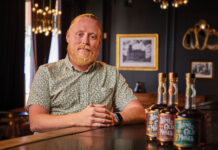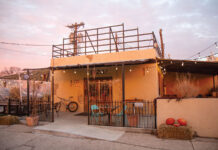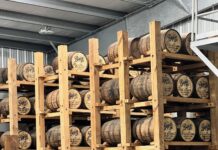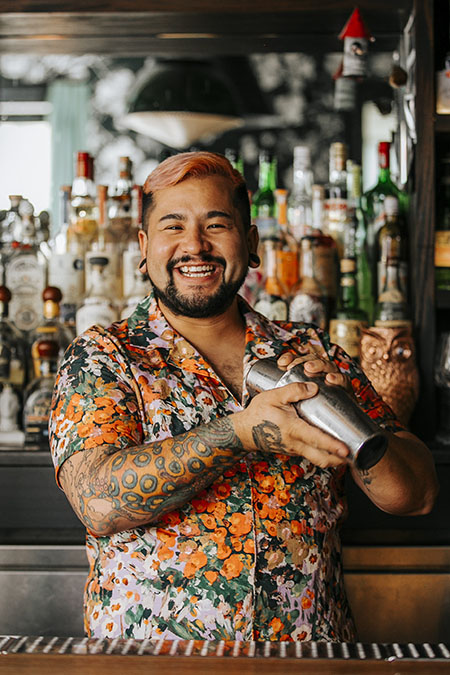
Photo © Jasmin Dolia
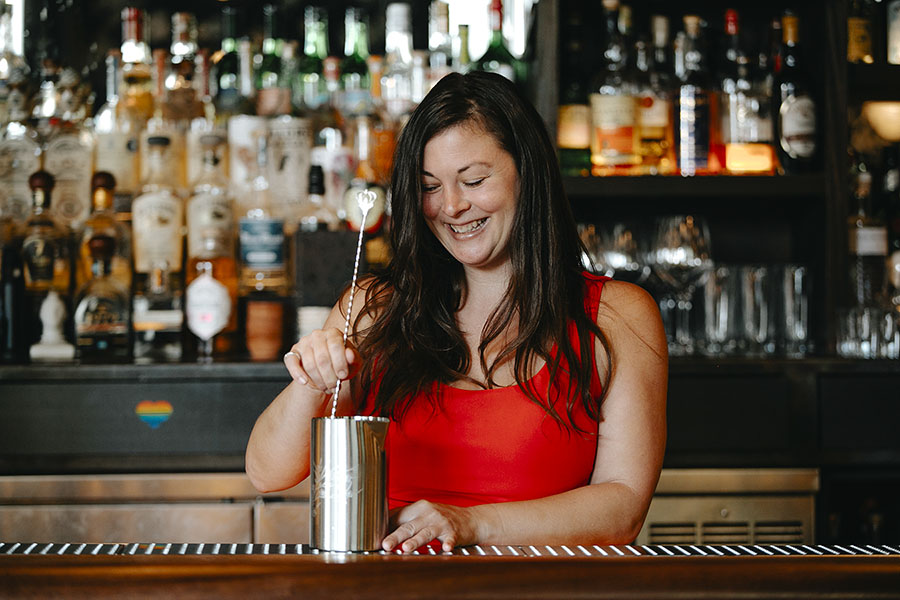
Photo © Jasmin Dolla
The San Francisco Bay Area pioneered cocktails first in the 1800s as cocktail bars rose to prominence, then again the last 30 years as a global renaissance was revived starting in its original birth towns of SF and NYC. So SF is a city rife with bar talent and pioneers, a close-knit drink community that watches out for each other, values inclusion, vision and creativity, yet keeps it low-key and approachable.
Christian “Suzu” Suzuki and Marguerite Regan are prime examples of the caliber of bartenders in the Bay, and both just took over management of The PlumpJack Group’s Wildhawk this summer of 2021 as longtime bar manager Karri Kiyuna left. The bar was opened in 2016 by then Plumpjack Group’s Jacques Bezuidenhout and Ken Luciano, the former of whom created the bar’s iconic Breakfast Negroni infused with Cocoa Puffs and served in a mini-bowl, which is thankfully still on the menu. The space was formerly legendary neighborhood lesbian bar, The Lexington. Currently laid back and welcoming, the cozy space and parklet is the backdrop for their complex-yet-crushable cocktails, robust low-proof vermouth cocktails and famed martini section (including Suzu and Regan’s new Vespertine, “The Elusive Chanteuse,” martini, silky with Four Pillars Navy Strength Gin, Bombay Sapphire East Gin, Nikka Vodka and Mancino Sakura [cherry blossom] Vermouth).
But Regan and Suzuki have been part of the team for years (Marguerite since opening) — and boast a history of hospitality and bar experience going back the better part of two decades. As bar manager and SF native, Suzu was a national finalist for Bombay Sapphire’s “Most Imaginative Bartender” competition in 2020 and national finalist for Bacardi Legacy in 2018. His vibrant humor and passion for the industry stems from his family roots in Japan and grandparents who ran successful restaurants there post-World War II.
Getting his SF start in North Beach treasure 15 Romolo, a pioneering bar since the 1990s, he worked his way up from cocktail server to a manager. Bartending at Wildhawk since 2018, he has also bartended or managed at bars like Tradition and Benjamin Cooper. In pandemic, he regularly taught online cocktail classes and launched Kagano Bar, a pop-up based on his grandparents bar in Japan in the 1950s-60s. Each of his cocktails represents a story passed down from his grandparents and features Japanese-centric ingredients. His pop-up supports (via events and fundraisers) and collaborates with hospitality workers who identify as POC, LGBTQ+, all genders and immigration statuses and those with physical and developmental working conditions.
As bar supervisor, Marguerite has been in the hospitality industry since she was 15 years old, her lifelong love of the industry and hard-working dedication driving her welcoming spirit. Growing up in Dearborn, Michigan, her childhood, Prohibition-era home hid an antique bar in the basement. After being introduced to the show “Cheers” as a little girl, she and her sister often played bartender. After moving to the Bay Area, Regan held roles at Drexl in Oakland, Rye in San Francisco, then became part of the opening team at Wildhawk. She won the Tullamore D.E.W. Bar Stories competition in 2015 and has competed in numerous competitions.
In their own words, Marguerite and Suzu tell us about their journey into the bar world, how they decide what brands to stock and how they are navigating pandemic, burnout, vaccines and the current landscape with their team.
What led you into the cocktail and the bar world?
Marguerite: I have been in hospitality since I was a teenager, but when I moved to the Bay Area from Arizona, I started working at Garibaldi’s in Oakland (now shuttered). That restaurant introduced me to craft cocktails. I was able to work behind the bar for brunch and was a cocktail server during happy hour. I met so many “cocktail nerds” and cocktail bartenders that I was soon reading up on classic cocktails and trying them out at brunch. Garibaldi’s became Hudson and while there, my cocktail knowledge ramped up while I was working with some fantastic bartenders led by Alex Condé (now of Drexl in Oakland). I eventually moved on to only working at bars when Hudson shuttered and was lucky enough to be given opportunities to work at bars like Rye, Burritt Room (RIP), East Bay Spice Co. and Drexl, before landing at Wildhawk.
Christian: I think anyone who has met me or heard my story would know that I grew up in the restaurant/bar industry through my grandparents. Long story short, they began a restaurant business in the 1940s which blossomed into a small company that operated five restaurants, a cocktail bar and a ranch that sourced all produce for the businesses. I grew up into working at two of the restaurants — returning back to Japan anywhere between two to three times a year to learn about the business, between the ages of 12 to 18. However, I didn’t originally anticipate following their steps.
I moved back to Tokyo right after high school and worked under their tutelage. As a side gig, I picked up a bartending job for a few months at a nightclub in the Omotesando Hills neighborhood of Tokyo. At that time, I had a dream of going into film writing, where the universe of expression was being translated onto pen. I truly disliked my nightclub job and went back to working full-time for my grandparents. Their establishment had me re-appreciate their love and dedication to hospitality and that this was the path I want to follow. Yet I yearned for a platform and medium to share my stories.
When I moved back to the Bay Area, I went back into restaurant hospitality by landing a gig as a manager at a higher-end sushi bistro where I created a produce-driven sake cocktail menu. I realized that cocktails could be my medium. I just needed the skills and knowledge. So I landed a job with 15 Romolo [a pioneering SF bar since the 1990s], where my career took a more serious turn.
What is unique about your bar and how does being based in San Francisco influence your bar’s style and operations?
Christian: Before Wildhawk came into existence, it was The Lexington Club: one of the country’s last lesbian bars. I can comfortably say that almost every day, we have guests who come in for the first time and share stories about their fabulous ladies nights, or how they met their partner there, or how safe they felt there. Folks come from all over the country to San Francisco and make Wildhawk a destination to reminisce about those times, but with hesitation about our space. When they see the different team lineups, they’ll notice that at one point our team was mostly women. Now we are mostly LGBTQ+. Between myself and Marguerite, Wildhawk is run by a woman and queer-POC.
We’ve witnessed so many of those hesitant folks love the bar and team and return again and again and again to support businesses run by folks who cover several marginalized groups but also a business that has created a space for everyone. Our goal at Wildhawk is to continue a “community” concept: a safe space and environment for anyone who may have not felt safe or welcomed at other bars.
Marguerite: Wildhawk is unique because it is a neighborhood bar, so we are a comfy-cozy room with a fun cocktail list. We are also in the space that used to house The Lex, a famous lesbian bar, so we remember to keep Wildhawk a safe, inclusive space. Our bar is small but very welcoming and fun.
What is your philosophy on deciding what brands/bottles to stock in your bar?
Marguerite: We don’t have a philosophy on what brands come in. We do like small brands and unique spirits with sustainable models, but we also love classic brands that have been in the business of making people delicious drinks for hundreds of years. Space is a big concern, so whatever we bring in we want to make sure people drink. We are excited about the spirits on our back bar — there is always something interesting to try.
Christian: Obviously, whatever we feel is delicious is #1. I never allow trends and opinions of others to pursue how I drink. A trend you may see behind how I develop cocktails or my philosophy of hospitality and service is storytelling. I love a good story. I love hearing the stories behind some of these brands. Just recently, I brought in several products that I enjoyed consuming, but I also enjoyed the stories that came with them. From a master distiller who brings in troubled gang members to work for his distillery and create a better life, to a new brand inspired by the owner’s pregnancy when her senses were all amplified, Wildhawk’s backbar is stocked with liquid expression. It’s beautiful.
How do you educate customers on small batch, quality spirits?
Christian: As a bartender, we are the middle person between a brand and consumer. It’s our job to relay their story to whomever may show interest. Sometimes, using bar lingo or distilling language can be overwhelming for folks who aren’t as knowledgeable, or even care. So I use storytelling as an approachable way to educate, create interest and converse memorable facts that a guest can come back and feel confident ordering again.
Marguerite: We as a staff have bar labs where we are educated on the spirits we bring in, as well as categories of spirits. This allows us to educate our guests on the spirits. When we are excited about something, that is easily translated to our guests.
How are you and your team surviving pandemic and what new forms of business or ideas have you implemented? What is your take on the vaccinations required movement among San Francisco bars?
Marguerite: Our team is all vaccinated and we wear masks at work. We started before the SF mandate. We trust in the science behind the vaccine, but with the Delta variant we are being careful as we realize that if we get sick, we could get others sick. To keep the doors open, we started doing to-go cocktails and outdoor seating. As far as asking for proof of vaccination, I think it is great that people are being held accountable for their own and other’s health. A private business has every right to create a safe space for their employees as well as their guests. We don’t require proof of vaccination, but I understand why some bars are requiring it.
Christian: I’ve got to be 100% honest, most of the pandemic I was not working at any bar. I was teaching virtual cocktail classes. My co-manager, Marguerite, helped Wildhawk continue to soar throughout this entire era. She was there when we, like many other bars, had to transform our floor into a kitchen and serve food. She was serving outside, holding a line, managing a socially distanced bathroom… really keeping the business afloat. We had a contactless menu on a QR code and two parklets.
I came back to work earlier this year. When the weather got nicer, our parklets were at capacity and eventually the state allowed 25% capacity indoors. When we hit capacity inside and out, we were just as busy before the pandemic. Our sales weren’t that far off from before, but so much more work was being put in. With everything happening so fast and trying to keep up with new CDC guidelines and new allowances of extended hours, I decided not to take advantage of every beneficial step.
For example, when San Francisco’s curfew was extended from 10pm to 2am, we closed the bar at 12am. We were all working so hard and I was getting worried about the physical and mental health of our team. Our industry is already so demanding on our bodies and opening an extra 4 hours plus the extra few hours to close down wasn’t going to positively contribute to my team. We took an entire month to prepare our minds and bodies for a 2am close.
I’ve also given the team [space] to voice an opinion on how we want to move forward with vaccination requirements. Currently, we are split between requiring proof of vaccination vs. how not allowing unvaccinated guests or proof of vaccination will affect our income. Even though we’re all still trying to navigate our future at Wildhawk, the open discussion has allowed us to weigh out each other’s pros and cons.
More than ever, it has been more okay to not follow the general trends of bar culture. We have been so conditioned to think business first and personal/mental health second. So many folks in our industry have left for that reason. Today, we have a chance to change that lifestyle and create a work environment that puts employees first. It’s still a work in progress at our bar, but I really do want my team at the very least to know that I will forever be there to support them.
How do you envision the bar world evolving in the coming years?
Christian: I believe the bar world is going to become more approachable, sensitive and understanding of employee needs. I think a lot of veterans in this industry have this hazing mentality: that everything was harder “back in the day.” I’m 100% guilty of this.
As I’ve brought in newer employees who may have not had the same career path I have had, I have to remind myself every day that my career past should not be an expectation for a future employee. As mentioned above, this era is our opportunity to create a more approachable industry that will entice more people to stay and believe in career longevity.
Marguerite: I think that the bar world is always changing as we educate ourselves on what is out there. The hospitality industry changes with its people and there has been a giant turnover in bars and restaurants due to the pandemic. I hope we see another “Roaring 20’s” over the next decade but also keep bars a safe place for everyone.

